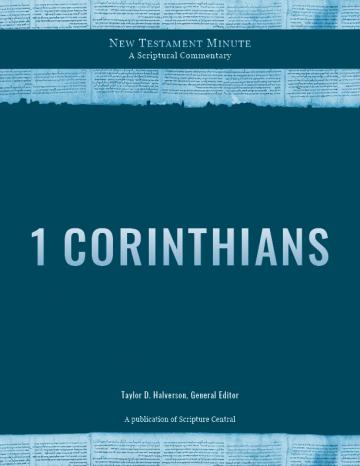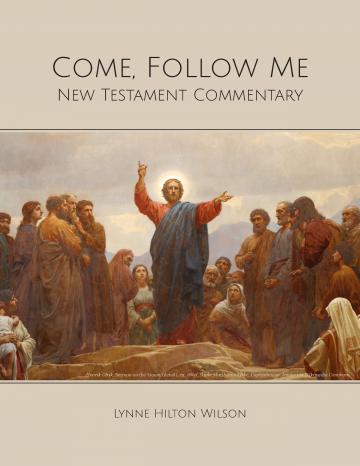You are here
Book of Mormon Central is in the process of migrating to our new Scripture Central website.
We ask for your patience during this transition. Over the coming weeks, all pages of bookofmormoncentral.org will be redirected to their corresponding page on scripturecentral.org, resulting in minimal disruption.

1 Corinthians 14–16
Scripture Central Videos
Watch videos from Gospel scholars and teachers to learn more about these New Testament passages. Scripture Central produces weekly videos from Tyler Griffin, Taylor Halverson, Clint Mortenson, John Hilton III, and Lynne Hilton Wilson.
Other Creator Videos
Commentary
The New Testament Minute is a commentary series made especially for the free ScripturePlus app, which features insights from New Testament scholars. many of the insights in the New Testament Minute are gleaned from the BYU New Testament Commentary series. Lynne Hilton Wilson has written a commentary to supplement her New Testament video series.
Michael D. Rhodes
Taylor Halverson, General Editor
Reading Plan
Structure your personal scripture study by following a 15-minute, day-by-day plan. Each day's assignment includes the required scripture passages from the Come, Follow Me curriculum, as well as suggestions for additional resources to bring context and understanding to your study. For the best experience, use our Reading Plan in the free ScripturePlus app! You can track your progress and have access to the best resources.
Monday
- Verse of the Day: 1 Corinthians 14:20
- Scripture: 1 Corinthians 14:1-25
- Commentary: 1 Corinthians 14:1–12
- Commentary: 1 Corinthians 14:3–6
- Commentary: 1 Corinthians 14:7–11
- Commentary: 1 Corinthians 14:12
- Commentary: 1 Corinthians 14:13-16
- Commentary: 1 Corinthians 14:22–25
Tuesday
- Verse of the Day: 1 Corinthians 14:33
- Scripture: 1 Corinthians 14:26-40
- Commentary: 1 Corinthians 14:26
- Commentary: 1 Corinthians 14:26–33
- Commentary: 1 Corinthians 14:34–36
- Commentary: 1 Corinthians 14:39–40
Wednesday
- Verse of the Day: 1 Corinthians 15:10
- Scripture: 1 Corinthians 15:1-19
- Commentary: 1 Corinthians 15:1–11
- Commentary: 1 Corinthians 15:12–19
Thursday
- Verse of the Day: 1 Corinthians 15:21-22
- Scripture: 1 Corinthians 15:20-34
- Commentary: 1 Corinthians 15:20–28
- Commentary: 1 Corinthians 15:29–34
Friday
- Verse of the Day: 1 Corinthians 15:54
- Scripture: 1 Corinthians 15:35-58
- Commentary: 1 Corinthians 15:36–39
- Commentary: 1 Corinthians 15:40–41
- Commentary: 1 Corinthians 15:45
- Commentary: 1 Corinthians 15:50
- Commentary: 1 Corinthians 15:49–50
- Commentary: 1 Corinthians 15:51
- Commentary: 1 Corinthians 15:56
- Commentary: 1 Corinthians 15:57
Saturday
- Verse of the Day: 1 Corinthians 16:9
- Scripture: 1 Corinthians 16:1-12
- Commentary: 1 Corinthians 16:1–4
- Commentary: 1 Corinthians 16:5–12
Sunday
- Verse of the Day: 1 Corinthians 16:14
- Scripture: 1 Corinthians 16:13-24
- Commentary: 1 Corinthians 16:13–16
- Commentary: 1 Corinthians 16:17–20
- Commentary: 1 Corinthians 16:21–24
Joseph Smith Translation Variants
Explore Joseph Smith's inspired translation of the bible by comparing his changes to the King James Version of the New Testament. To learn more, see Joseph Smith's Translation of the Bible: The Joseph Smith Translation and the King James Translation in Parallel Columns.
1 Corinthians 14
|
KJV |
JST |
|
(2) For he that speaketh in an unknown tongue speaketh not unto men, but unto God: for no man understandeth him; howbeit in the spirit he speaketh mysteries. |
(2) For he that speaketh in another tongue speaketh not unto men, but unto God: for no man understandeth him; howbeit in the spirit he speaketh mysteries. |
|
(4) He that speaketh in an unknown tongue edifieth himself; but he that prophesieth edifieth the church. |
(4) He that speaketh in another tongue edifieth himself; but he that prophesieth edifieth the church. |
|
(13) Wherefore let him that speaketh in an unknown tongue pray that he may interpret. |
(13) Wherefore let him that speaketh in another tongue pray that he may interpret. |
|
(14) For if I pray in an unknown tongue, my spirit prayeth, but my understanding is unfruitful. |
(14) For if I pray in another tongue, my spirit prayeth, but my understanding is unfruitful. |
|
(19) Yet in the church I had rather speak five words with my understanding, that by my voice I might teach others also, than ten thousand words in an unknown tongue. |
(19) Yet in the church I had rather speak five words with my understanding, that by my voice I might teach others also, than ten thousand words in another tongue. |
|
(27) If any man speak in an unknown tongue, let it be by two, or at the most by three, and that by course; and let one interpret. |
(27) If any man speak in another tongue, let it be by two, or at the most by three, and that by course; and let one interpret. |
|
(34) Let your women keep silence in the churches: for it is not permitted unto them to speak; but they are commanded to be under obedience, as also saith the law. |
(34) Let your women keep silence in the churches: for it is not permitted unto them to rule but |
|
(35) And if they will learn any thing, let them ask their husbands at home: for it is a shame for women to speak in the church. |
(35) And if they will learn anything, let them ask their husbands at home: for it is a shame for women to rule in the church. |
1 Corinthians 15
|
KJV |
JST |
|
(10) But by the grace of God I am what I am: and his grace which was bestowed upon me was not in vain; but I laboured more abundantly than they all: yet not I, but the grace of God which was with me. |
(10) But by the grace of God I am what I am: and his grace which was bestowed upon me was not in vain for I labored more abundantly than they all: yet not I, but the grace of God which was with me. |
|
(24) Then cometh the end, when he shall have delivered up the kingdom to God, even the Father; when he shall have put down all rule and all authority and power. |
(24) Afterward cometh the end, when he shall have delivered up the kingdom to God, even the Father; when he shall have put down all rule and all authority and power. |
|
(26) The last enemy that shall be destroyed is death. |
(26) The last enemy, death shall be destroyed. |
|
(27) For he hath put all things under his feet. But when he saith all things are put under him, it is manifest that he is excepted, which did put all things under him. |
(27) For he saith, when it is manifest that he hath put all things under his feet and that all things are put under, he is excepted of the Father, who did put all things under him. |
|
(31) I protest by your rejoicing which I have in Christ Jesus our Lord, I die daily. |
(31) I protest unto you the resurrection of the dead, and this is my rejoicing which I have in Christ Jesus our Lord daily, though I die. |
|
(37) And that which thou sowest, thou sowest not that body that shall be, but bare grain, it may chance of wheat, or of some other grain: |
(37) And that which thou sowest, thou sowest not that body which shall be, but |
|
(40) There are also celestial bodies, and bodies terrestrial: but the glory of the celestial is one, and the glory of the terrestrial is another. |
(40) |
|
(46) Howbeit that was not first which is spiritual, but that which is natural; and afterward that which is spiritual. |
(46) Howbeit that which is natural first and not that which is spiritual. But afterwards that which is spiritual. |
|
(52) In a moment, in the twinkling of an eye, at the last trump: for the trumpet shall sound, and the dead shall be raised incorruptible, and we shall be changed. |
(52) In a moment, in the twinkling of an eye, at the sound of the trump. For the trumpet shall sound, and the dead shall be raised incorruptible, and we shall be changed. |
1 Corinthians 16
|
KJV |
JST |
|
(9) For a great door and effectual is opened unto me, and there are many adversaries. |
(9) For a great door and effectual is opened unto me, but there are many adversaries. |
|
(20) All the brethren greet you. Greet ye one another with an holy kiss. |
(20) All the brethren greet you. Greet ye one another with a holy salutation. |
Reading Resources
1 Corinthians 14–16
Lynne Wilson, "1 Corinthians 14-16," Come Follow Me: The New Testament, 2019.
Commentary
- Talyor Halverson, “Let all things be done decently and in order,” Interpreter Foundation, July 7, 2013.
The Gift of Prophecy
- Dean Sorensen, “Is the gift of prophecy limited to those whom we sustain as prophets, seers, and revelators?” Ensign, April 1990.
Paul and Keeping Women Silent
- Sherrie Mills Johnson, “Paul’s Teachings in 1 Corinthians on Women,” Shedding Light on the New Testament: Acts–Revelation, ed. Ray L. Huntington, Frank F. Judd Jr., and David M. Whitchurch (Provo, UT: Religious Studies Center, Brigham Young University, 2009), 129–52.
- Richard D. Draper, “New Light on Paul’s Teachings,” Ensign, September 1999.
Baptisms for the Dead
- H. David Burton, “Baptism for the Dead: LDS Practice,” Encyclopedia of Mormonism
- Krister Stendahl, “Baptism for the Dead: Ancient Sources,” Encyclopedia of Mormonism
- David M. Calabro, “Early Christian Temples and Baptism for the Dead: Defining Sacred Space in the Late Antique Near East,” Interpreter: A Journal of Latter-day Saint Faith and Scholarship 46 (2021): 77-100.
- Kevin L. Barney, “Baptized for the Dead,” Interpreter: A Journal of Latter-day Saint Faith and Scholarship 39 (2020): 103-150.
- Daniel B. Sharp, "Vicarious Baptism for the Dead: 1 Corinthians 15:29,” Studies in the Bible and Antiquity 6, no. 3 (2014).
- Robert L. Millet, “Was baptism for the dead a non-Christian practice in New Testament times (see 1 Cor. 15:29), or was it a practice of the Church of Jesus Christ, as it is today?” Ensign, August 1987.
- David L. Paulsen, Roger D. Cook, and Kendel J. Christensen, “The Harrowing of Hell: Salvation for the Dead in Early Christianity,” Journal of Book of Mormon and Other Restoration Scripture 19, no. 1 (2010): 56–77
- David L. Paulsen and Brock M. Mason, “Baptism for the Dead in Early Christianity,” Journal of Book of Mormon and Other Restoration Scripture 19, no. 2 (2010): 22–49.
- David L. Paulsen, Kendel J. Christensen, and Martin Pulido, "Redeeming the Dead: Tender Mercies, Turning of Hearts, and Restoration of Authority," Journal of the Book of Mormon and Other Restoration Scripture 20, no. 1 (2011): 28–51.
- David L. Paulsen, Kendel J. Christensen, Martin Pulido, and Judson Burton, “Redemption of the Dead: Continuing Revelation after Joseph Smith,” Journal of Book of Mormon and Other Restoration Scripture 20, no. 2 (2011): 52–69.
Christ’s Victory Over Death
- Paul V. Johnson, “And There Shall Be No More Death,” General Conference April 1985.
- Nicholas J. Frederick, “‘If Christ Had Not Come into the World’,” in Abinadi: He Came Among Them in Disguise, ed. Shon D. Hopkin (Provo, UT: Religious Studies Center; Salt Lake City: Deseret Book, 2018), 117–138.
- Robert J. Matthews, “Resurrection: the Ultimate Triumph,” in Jesus Christ: Son of God, Savior, ed. Paul H. Peterson, Gary L. Hatch, and Laura D. Card (Provo, UT: Religious Studies Center, Brigham Young University, 2002), 313–33.
- David Larsen, “Death Being Swallowed Up in Netzach in the Bible and the Book of Mormon,” BYU Studies Quarterly 55, no. 4 (2016): 123–134.
Resurrected Bodies
- Bruce K. Satterfield, “Nature of Resurrected Bodies,” Brigham Young University
- Jared T. Parker and Todd B. Parker, “An Analysis of the Joseph Smith Translation of 1 Corinthians 15:40,” Religious Educator 19, no. 2 (2018): 83–117.
- J. Peter Hansen, “Paul the Apostle: Champion of the Doctrine of the Resurrection,” in Go Ye into All the World: Messages of the New Testament Apostles, 31st Annual Sidney B. Sperry Symposium (Salt Lake City: Deseret Book, 2002), 13–26.
















